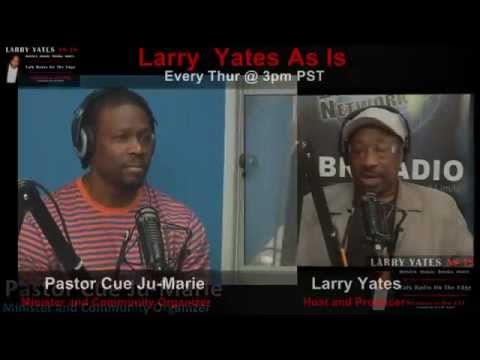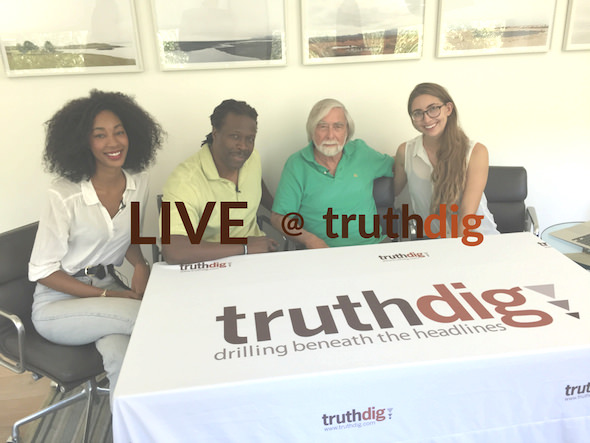Compassion Leads to Action When It Comes to Racial Injustice
The Truthdig team sat down with Pastor Cue Jean Marie, a Los Angeles-based activist and prominent figure in the local chapter of the Black Lives Matter movement, to discuss social and racial injustice.

From left: Sarah Wesley, Pastor Cue, Robert Scheer and Emma Niles.
On Thursday, Truthdig sat down with Pastor Cue Jean Marie for a live conversation, streamed on our Facebook page, on how to address racial inequality. Pastor Cue is a prominent figure in the Los Angeles Black Lives Matter movement. He also founded The Row, “a church without walls” based “in the heart of Skid Row,” and is the founder of Creating Justice L.A., an organization designed to educate and advocate for policies relating to racial inequality and homelessness.
“Skid Row is a microcosm of America,” Pastor Cue said at the beginning of the live discussion. “We’re attempting to rectify mental illness with jails, prisons and police.”
Pastor Cue: “I think Jesus was the greatest activist that ever lived because he went against the grain.” https://t.co/vgkdMIkeUe
— Truthdig (@Truthdig) September 29, 2016
The “Live at Truthdig” conversation revolved around compassion, faith, and an overhaul of the American capitalist system.
Racial inequality in the United States has received heightened attention in recent weeks due to a series of police shootings of African-American men across the nation. Terence Crutcher was shot and killed in Tulsa, Okla.; the police officer who shot him has since been charged with manslaughter. Keith Lamont Scott was shot and killed in Charlotte, N.C. The controversial shooting sparked massive protests in the city.
On Monday night, Donald Trump and Hillary Clinton participated in the first of this fall’s presidential debates. One of the key topics? America’s “racial divide.” The two nominees had drastically different propositions for how to address the issue. Truthdig Associate Editor Alexander Kelly writes:
Trump says, “We need law and order in our country.” Blacks and Latinos in American inner cities “are living in hell.” To “stop the violence,” we need to restore “law and order.” Stop-and-frisk worked in New York, he says, adding that illegal immigrants form gangs, “have guns and they shoot people.” [Moderator Lester] Holt interjects that stop-and-frisk was ruled unconstitutional in New York. Trump confidently says Holt is wrong and asserts that opinion in courts across the country is divided. Violence in the cities is getting worse. Police are killed senselessly.
Clinton says Trump paints a negative image of black communities. “There’s a lot that we should be proud of.” Stop-and-frisk “was found to be unconstitutional. … I believe in community policing. … We’ve had 25 years of very good cooperation” but there’s still work to do. Clinton says she’s “glad we’re ending private prisons” at the federal level and offers a host of policing reforms.
Just one day later, an African-American man was shot and killed in Southern California. CNN reports that no weapon was found at the scene of the crime, and activists are calling for action.
Although new technology has made capturing and sharing moments of police brutality easier over the past decade, legislation is being created to continue to uphold racist structures. Several months before Scott’s death, legislators in North Carolina passed House Bill 972. The bill, which goes into effect in October, classifies body-camera and dash-camera footage, thereby preventing it from being released to the public.
Demonstrations continue to be organized to combat racism throughout the country, including those launched by local activists to protest these too-common fatal police shootings. In addition to the local responses, more than 70,000 people have committed to participating in a nationwide boycott against injustice planned for Dec. 5. The boycott’s Facebook page states that it will be “unlike anything this nation has seen since the Civil Rights Movement.”
Do these organized protests, peaceful or disruptive, incite true change? What are other ways we, as a nation, can attempt to solve centuries of racial injustice?
Activist and author Shaun King recently wrote a detailed Facebook post in which he outlines 25 ways to reduce police brutality in America. “Our law enforcement and criminal justice system is not broken,” he wrote in a separate article. “It is hundreds of years old, its systems and structures are deeply engraved, and making moves that actually move the needle on police brutality will not be easy.”
Pastor Cue has fought for the $15 minimum wage.
He has also preached about Martin Luther King Jr.’s legacy and organized the 2015 Los Angeles MLK Legacy March.
You can watch past editions of “Live at Truthdig” here.
—Posted by Emma Niles
Independent journalism is under threat and overshadowed by heavily funded mainstream media.
You can help level the playing field. Become a member.
Your tax-deductible contribution keeps us digging beneath the headlines to give you thought-provoking, investigative reporting and analysis that unearths what's really happening- without compromise.
Give today to support our courageous, independent journalists.





